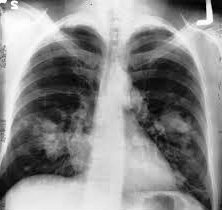18. Cancer
In the case of cancer patients, more organs are often affected. When evaluating patients with cancer prior to air travel, it is important to make an holistic evaluation.
Photo: Wikimedia Commons
General
Due to invasion and metastasis, cancer disorders often present a complex pathological picture with possible symptoms from many organs.
Particularly in the case of cancer patients, it is important to make a holistic evaluation before deciding upon means of transportation, escort, etc.
When evaluating transportation, one should pay special attention to whether there are:
• Pleural effusions, tumour growth within the lungs or severe ascites, all of which complicate
respiration.
• Pressure on vital organs, such as the trachea, larger vessels, or nerves.
• Cerebral metastases that can cause increased intracranial pressure.
• Anaemia, hypercalcaemia, or other electrolyte imbalances.
• Serious mental problems.
Untreated, all the abovementioned conditions may be contraindications for transporting the patient by commercial flight.
Before transportation, it is important to optimise the patient’s condition in the best possible way. Pleural effusions should be drained, anaemic patients should be given a blood transfusion, electrolyte imbalances should be corrected, and so on.
Most cancer patients may be transported by commercial flight, but in the case of terminal and preterminal patients, their condition is often so unstable that transportation is only possible by air ambulance.
Advising cancer patients planning to travel by air
Cancer patients in good phase
Principally, cancer patients in a stable and good phase can go on short trips abroad. However, it is important to get approval from the treating physician, the physician representing the airline, and the insurance company if they wish to be covered by their insurance. Often there is a large discrepancy between what the treating physician and the insurance companies accept. Insurance wise, it is not enough that the treating physician has approved the journey.
Cancer patients in unstable phase
Cancer patients in critical condition or an unstable phase should not travel. This includes patients undergoing and just having received chemotherapy.
Unfortunately, it is often the case that extremely ill cancer patients will undertake long journeys, and, because of the deterioration in their condition, are prevented from returning home by air, or even from being transported home by any means at all. It can be an extremely unpleasant and expensive experience for a patient to have to remain in a foreign hospital and, sometimes, to die there, because their condition makes repatriation by air impossible.
These situations are usually not covered by travel insurance companies.
In this context, it should be mentioned that any physician responsible for a cancer patient who is planning a long overseas journey should point out the risk of the disease preventing return or transportation home. It is recommended to give this message in writing too.
001. Frontpage
001. Foreword
001. Contributors
001. Aeromedical Problems
012. Planning the Air Transportation of Patients
013. Airline Requirements
015. Transportation of Disabled Persons
016. Cardiac Disorders
019. Gastrointestinal Disorders
010. Central Nervous System Disorders
011. Ear, Nose, and Throat Disorders
012. Eye Disorders
013. Mental Disorders
014. Gynaecological and Pregnancy Problems
015. Transportation of Sick Children
016. Infectious Diseases
017. Orthopaedic Injuries
018. Cancer
120. Acute Mountain and Decompression Sickness
021. Burns and Plastic Surgical Problems
122. Airsickness
123. Jet Lag
124. The STEP System
125. Specialised Transportation of Patients
126. First Aid on Board – Legal Considerations
27. The History of Air Transportation of Patients
28. Oxygen supplementation in flight - a summary
Latest update: 29 - 02 - 2020
